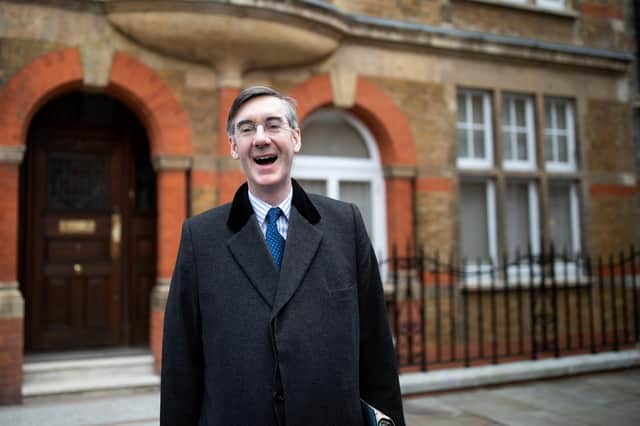If Boris Johnson resigns, Scottish Tories may still have to deal with a UK party wedded to English nationalism wrapped in a Union flag – Joyce McMillan


It happened to Anthony Eden in 1957, and – most famously – to Margaret Thatcher in 1990. And now, with many Tories calling for his resignation, Scottish MSPs in full revolt, and erstwhile friends in the media turning against him, it looks as though Boris Johnson’s days in Downing Street may – just may – be numbered.
This is, of course, what traditionally counts as a huge story in British politics. If Johnson goes, the atmosphere and personnel around Downing Street will change, and the image of national politics projected by the media to 66 million UK citizens will change with them.
Advertisement
Hide AdAdvertisement
Hide AdA new Prime Minister will traditionally enjoy a bounce in popularity; and support for Scottish independence may decline a little, as it did in the early days of Theresa May’s government, as ever-cautious Scottish voters resolve to see whether “the new lot” offer better prospects for good governance than the old.
It’s therefore worth remembering, while the Downing Street drama plays out, that the underlying purpose of these Tory upheavals is not change but continuity; and that leaders tend to be discarded not when the party wants a change of policy, but when a leader has become a threat to its hold on power.
Whoever replaces Boris Johnson, should he resign, will therefore almost certainly be picked not for promising change, but for his or her willingness to sustain the broad thrust of current Tory policy, while adopting the more sober and trustworthy tone that befits difficult times.
It is just possible, of course, than any imminent Tory leadership election could prove more interesting than that. There are some Tory MP’s, particularly in the Red Wall group, who are genuinely unhappy about the party’s continuing passion for free market and deregulatory solutions to all problems, and may well be appalled by the conduct of the Johnson government in matters such as the allocation of pandemic contracts, some aspects of which were this week ruled unlawful at the High Court in London.
Likewise, some MPs are unhappy about the assaults on basic civil rights and liberties contained in current legislation on policing, nationality, and voting. And after Jacob Rees-Mogg’s astonishing display of contempt for Douglas Ross and Scottish Tory MSPs, there must be some members in both Scotland and Wales who feel that the party’s current “muscular unionism”, and open disdain for the 1998 devolution settlement, has gone far enough.
In truth, though, there is little sign, so far, of those who dissent from the current right-wing thrust of Tory policy forming into any kind of coherent group, to match the impact of the pro-hard-Brexit ERG faction that has now re-emerged as the Covid Recovery Group; and it is because of the continuing influence of this group that the main candidates now being mentioned for the top job are figures such as Foreign Secretary Liz Truss, a former Remainer now advocating for Brexit with the zeal of a slightly deranged convert.
Even the Chancellor Rishi Sunak now seems a shade too moderate to satisfy the CRG, despite his hawkish instincts on public spending; and beyond that, the list of possible candidates reads like a record of the stripping-out of talent and political experience that accompanied Boris Johnson’s 2019 takeover of the parliamentary Tory Party, and the culling of centre-right Tory MPs in the subsequent general election.
Figures like Priti Patel and Deputy Premier Dominic Raab are seen as ambitious but marginal. More substantial and experienced politicians like Sajid Javid and Jeremy Hunt seem to lack any organised body of support in the parliamentary party; and Michael Gove’s ambition is now matched by even greater levels of unpopularity than he achieved back in 2016, when he famously stabbed Boris Johnson in the back to run briefly for the top job himself.
Advertisement
Hide AdAdvertisement
Hide AdThe field is thin, in other words; and there is certainly no candidate who seems likely to offer a coherent prospectus for the more nuanced and moderate form of 21st century Toryism that might help the party win the next UK general election, and reverse the slowly rising tide of support for independence in Scotland. Indeed, for some Tories, the very paucity of attractive alternatives may represent a persuasive argument for leaving Boris Johnson where he is, for the time being.
As for the Conservatives in Scotland, whose leaders have now found the courage to break with the Johnson government – for them, the question arises of whether there is any chance of the Tory Party at UK level now finding a leadership that understands devolution, and is willing to work with it in a constructive and respectful manner; or whether their party is now irreversibly wedded to a retro British nationalism that is effectively English nationalism wrapped in a Union flag.
For as we saw this week, this currently dominant form of British Conservatism – unlikely to be challenged during the present leadership crisis – now dismisses Scottish Tories in the Scottish Parliament almost as brutally as it dismisses the SNP.
And that suggests that for far-sighted Scottish Conservatives, the key question may soon no longer be how to preserve the Union their party has so carelessly undermined; but rather how best to advance centre-right politics in 21st century Scotland, whether the country becomes independent, or not.
A message from the Editor:
Thank you for reading this article. We're more reliant on your support than ever as the shift in consumer habits brought about by coronavirus impacts our advertisers.
If you haven't already, please consider supporting our trusted, fact-checked journalism by taking out a digital subscription.
Comments
Want to join the conversation? Please or to comment on this article.

